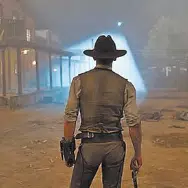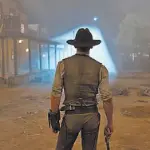As expected, this is another arthouse film dressed in the garb of a genre movie. However, what attracts me is not the suspense elements of the film but the title, "Anatomy of a Fall." I am curious, what exactly is falling or collapsing?

Marriage
On the surface, we witness the husband falling to his death, and the wife becomes the prime suspect, unraveling the detective work into the intricacies of their marital relationship. The film intersperses many joyful family photos, flashbacks to the highlights of their marital relationship. In an interview with the lawyer, Sandra, the wife, recalls the moment they first met, squinting and smiling shyly, still resembling a girl in love. "When he walked into a room, something changed with him, I guess that's charm."
However, during the subsequent trial, the distance and alienation in the marriage come to light. They have slept in different rooms, and the wife has had an affair last year. The husband, in order to accompany their son, reduced his time in university. He envies his wife's successful career and falls into depression due to his own creative failures. In the climax of the trial, the prosecution presents a recording of a heated argument between the husband and wife the day before his fall. In this recording, the couple argues about how to evenly distribute their work hours, what language to use to educate their son, and how to choose their place of residence—various contradictions confront each other. In the process, the wife heartlessly tells the husband, "This is life, everything is in a cycle!" It is the compromise of an idealist facing the mediocrity of life, still filled with anger.
The director weaves many metaphors into their relationship. The wife is German, the husband is French, and both of them speak English for fair communication. The more they try to be fair, the more they drift apart. Intimate relationships are supposed to involve mutual sacrifice and concessions, not negotiation and transaction. The different mother tongues also mean that, deep down, they cannot truly understand each other. The remote mountain cabin they live in, surrounded by desolate snow, is like the predicament of married life, with mosquitoes' blood on the floor and frost on the ground. Passion cools in the cycle of daily chores, like a long fall with a small petal falling silently.
In the narrative of a husband's tragic fall and the subsequent trial centering on suspicions surrounding the wife, we witness the beauty of old photos torn apart, exposing the mundane reality underlying a marital tragedy. Through this lens, we glimpse both the warmth and the coldness inherent in human hearts.

Truth
Would the wife kill the husband to resist a mediocre life? Would the husband commit suicide due to the failure of his career? Until the end, the film does not provide a clear answer because who the killer is often is already unimportant. The truth is just a conclusion of timely news, and what we want to see more is what collapses and then rebuilds in the twisting process of seeking the truth.
The director frequently employs the perspective of the 11-year-old son, Daniel, to observe and inquire during the trial. Daniel suffers from impaired vision due to a car accident, often seen in the film wearing sunglasses. These shades represent a secondary dimension within his cognitive world. Upon hearing the recording of his parents' fractured marriage during the trial, Daniel's trust in his mother's innocence teeters on the brink of collapse. The court-appointed guardian advises Daniel, "When evidence is lacking and the truth is challenging to bear, the only choice we have is to make a decision. Choose one side over the other." Ultimately, life is subjective, and decisions often hinge on subjective perspectives.
Daniel actively seeks evidence to verify his decision, deciding to believe his mother. He gives the dog the aspirin that his father once took when attempting suicide to validate his mother's testimony about the father's suicidal tendencies. Is this a moment of growth? In my opinion, the answer is affirmative because any active choice requires courage.

Boundaries
The wife is a powerful woman. She succeeded in the husband's field of failure and wrote a best-selling novel. But she is also a lonely woman. There are many ambiguous scenes in the film. We see her drinking red wine at the beginning with a female student who came for an interview. The conversation between the two is like a social dance, and the close-up shots intermittently lose focus, and the dialogue is like a cocktail party. However, the director stops short of depicting the wife's desires. The female student's interview is quickly interrupted by the husband's irritable music. Later, in the trial, the wife is revealed to be bisexual, becoming the target of attack. The boundaries of gender and societal biases are not easily overcome.
In the relationship between the wife and the lawyer, I also feel a layer of meaningful ambiguity, suppression, and hesitation. After winning the first trial debate, the wife and the lawyer celebrate with a drink on a snowy night, both slightly intoxicated, joking, "You're like a dog." They trust each other while speculating about each other's thoughts. The director leaves a blank space for the inner thoughts of the two, allowing people to imagine how the boundaries of their relationship might expand. In the final celebration of the victory, they both awkwardly hold Chinese-style small cups, behaving awkwardly. (A shout-out to prop artistry, switching to Western-style tall glasses wouldn't have had this subtle tension.) The wife, now proven innocent, suddenly freed from the scrutiny of the trial and society, is at a loss and bewildered. Now she has to face the huge emptiness of family life. Unable to get out of the role of a wife and mother, her relationship with the lawyer can only stop in the courtroom.
In the final scene, the wife lies down alone in the moonlight, embracing the dog, somewhat peaceful, somewhat desolate.

"Anatomy of a Fall" encompasses thematic elements prevalent in standard Cannes award-winning films, including aspects related to LGBT issues and feminism. This is another female director who won the Palme d'Or after "Titane" two years ago. Although the film's female protagonist wins the lawsuit, and passes the scrutiny of society, the director's attitude is not entirely positive. What I see more is care and compassion. After all, the film tells the story of a woman's crumbling family, the loss of realness, and the unfillable emptiness in her.




































Share your thoughts!
Be the first to start the conversation.